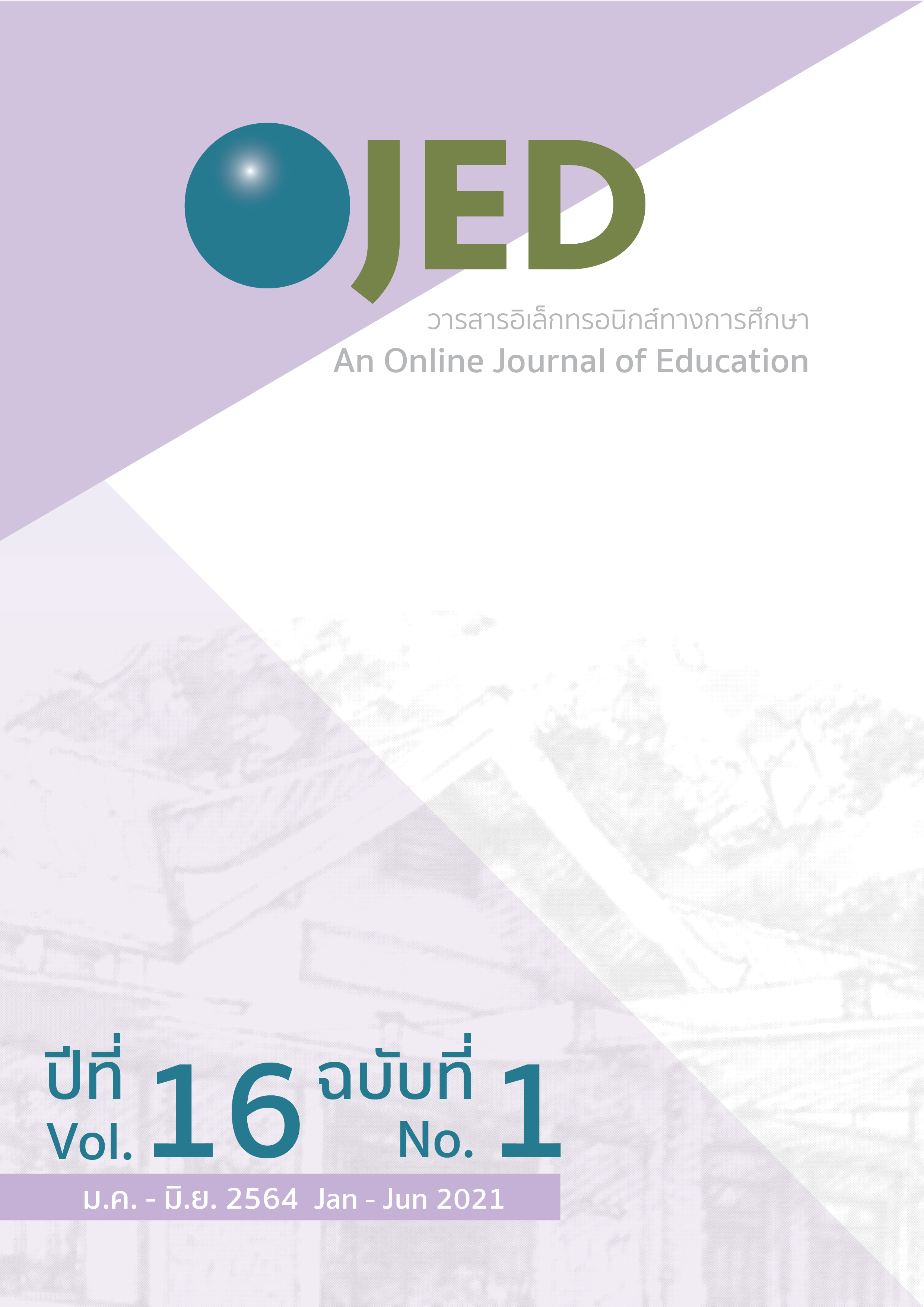Development of Learning Management Competencies for Undergraduate Students of Education Program Through Experiential Learning
DOI:
https://doi.org/10.14456/ojed.2021.9Keywords:
learning management competencies, experiential learning, undergraduate students of education programAbstract
The objective of this study was to 1) develop learning management competencies and
2) reflective teaching for the undergraduate students of the education program through experiential learning. The target group consisted of the undergraduate students majoring in Thai Language of education program studying in Thai language teaching skills. The research instruments were:
1) an evaluation form of learning management competency, and 2) a reflection form of learning management competency. The action research spirals were conducted through PAOR by collaboration in planning, classroom analyzing, learning management design, learning management practice, observation, and reflecting on the practice among students and lecturers. Data were analyzed by qualitative synthesis, data summarization from the occurred phenomenon in class, and participation in reflection of practice in developing and improving learning management. The results revealed two aspects in relation to the data analysis. First, for the learning management competencies including the three areas of competency: knowledge, skill, and attitude, it was found that the students were able to use their knowledge in real life situations. Second, the students revealed that the students paid attention to knowledge, Thai language structure and usage, literature, literary works as well as language use for communication, design for various learning activities and thinking development, construction of learning management media by technology usage, evaluation of students’ learning development, and sharing and reflection of collaborative practice as good guidelines for self-development through their reflections.
References
ภาษาไทย
กระทรวงศึกษาธิการ. (2562). มาตรฐานคุณวุฒิระดับปริญญาตรี สาขาครุศาสตร์และสาขาศึกษาศาสตร์
(หลักสูตรสี่ปี). เอกสารแนบท้ายประกาศกระทรวงศึกษาธิการ เรื่อง มาตรฐานคุณวุฒิระดับปริญญาตรี สาขาครุศาสตร์และสาขาศึกษาศาสตร์ (หลักสูตรสี่ปี) พ.ศ. 2562.
ทิศนา แขมมณี. (2563). ศาสตร์การสอน (พิมพ์ครั้งที่ 24). สำนักพิมพ์จุฬาลงกรณ์มหาวิทยาลัย.
เทพธิทัต เขียวคำ และ เจนสมุทร แสงพันธ์. (2562). การสะท้อนผลชั้นเรียนของครูในชุมชนการเรียนรู้
เชิงวิชาชีพที่ใช้นวัตกรรมการศึกษาชั้นเรียนและวิธีการแบบเปิด. วารสารมหาวิทยาลัยศิลปากร, 39(6), 187-198.
เบลเลนก้า, เจ และ แบรนดิด, อาร์. (2562). 21st Century skills rethinking how students learn [ทักษะแห่งอนาคตใหม่ : การศึกษาเพื่อศตวรรษที่ 21] (พิมพ์ครั้งที่ 3). บุ๊คสเคป.
ประภาวรรณ สมุทรเผ่าจินดา, จุฬารัตน์ วัฒนะ, และ วิกร ตัณฑวุฑโฒ. (2561). การพัฒนาความตระหนักในจิตสาธารณะของนักศึกษา คณะครุศาสตร์ มหาวิทยาลัยสวนดุสิตโดยการจัดกิจกรรมการเรียนรู้จากประสบการณ์. วารสาร Veridian E-Journal, Silpakorn University ฉบับภาษาไทย สาขามนุษยศาสตร์ สังคมศาสตร์และศิลปะ, 11(1), 2843-2855.
พิมพันธ์ เดชะคุปต์ และ พเยาว์ ยินดีสุข. (2561). การเรียนรู้เชิงรุกแบบรวมพลังกับPLCเพื่อการพัฒนา (พิมพ์ครั้งที่ 2). โรงพิมพ์แห่งจุฬาลงกรณ์มหาวิทยาลัย.
วัชรา เล่าเรียนดี. (2555). รูปแบบและกลยุทธ์การจัดการเรียนรู้เพื่อพัฒนาทักษะการคิด (พิมพ์ครั้งที่ 9). คณะศึกษาศาสตร์ มหาวิทยาลัยศิลปากร วิทยาเขตพระราชวังสนามจันทร์.
วิชัย วงษ์ใหญ่ และ มารุต พัฒผล. (2562). การประเมินตามสภาพจริงอิงสมรรถนะ. ศูนย์ผู้นำนวัตกรรมหลักสูตรและการเรียนรู้.
สำนักงานเลขาธิการสภาการศึกษา. (2560). กรอบคุณวุฒิแห่งชาติ ฉบับปรับปรุง. พริกหวานกราฟฟิค.
สุวิมล ว่องวาณิช. (2560). การวิจัยปฏิบัติการในชั้นเรียน (พิมพ์ครั้งที่ 19). โรงพิมพ์แห่งจุฬาลงกรณ์มหาวิทยาลัย.
ภาษาอังกฤษ
Baker, M., Robinson, S., & Kolb, D. A. (2012). Aligning Kolb’s experiential learning theory with a comprehensive agricultural education model. Journal of Agricultural Education, 53 (4), 1–16. https://doi.org/10.5032/jae.2012.04001
Beard, C., & Wilson, P J. (2013). Experiential Learning A handbook for education, training and Coaching (3rd edition). Replika Press.
Biech, E., (2015). 101 ways to make learning active beyond the classroom (active training series). Wiley.
Chan, C. K. Y., (2012). Exploring an experiential learning project through Kolb’s learning theory using a qualitative research method. European Journal of Engineering Education, 37(4), 405–415.
Douladeli, E. (2014). Experiential education through project based learning. Procedia-Social and Behavioral Sciences, 152, 1256–1260.
Fallon, G. (2019). Using simulations to teach young students science concepts: An Experiential Learning theoretical analysis. Computers & Education, 135, 138-159. https://doi.org/10.1016/j.compedu.2019.03.001
Girvan, C., Conneely, C., & Tangney, B. (2016). Extending experiential learning in teacher professional development. Teaching and Teacher Education, 58, 129-139. https://doi.org/10.1016/j.tate.2016.04.009
Hadar, L. L., Ergas, O., Alpert, B., & Ariav, T. (2020). Rethinking teacher education in a VUCA world: student teachers’ social-emotional competencies during the Covid-19 crisis. European Journal of Teacher Education, 43(4), 573-586. https://doi.org/10.1080/02619768.2020.1807513
Kolb, D. A. (2015). Experiential learning: experience as the source of learning and development (2nd Edition). Experience based learning systems.
Kolb, A. & Kolb D. (2018). Eight important things to know about the experiential learning cycle. the Australian Educational Leader, 40(3), 8-14.
Manolis, C., Burns, D. J., Assudani, R., & Chinta, R. (2013). Assessing experiential learning styles: A methodological reconstruction and validation of the Kolb learning style inventory. learning and individual Differences, 23, 44–52. https://doi.org/10.1016/j.lindif.2012.10.009
Millar, C., Groth, O., & Mahon, J. F. (2018). Management Innovation in a VUCA world: challenges and recommendations. California Management Review, 61(1), 5-14. https://doi.org/10.1177/0008125618805111
Reeves, T., & Reeves, P. (2015). Educational technology research in a VUCA World. Educational Technology, 55(2), 26-30. http://www.jstor.org/stable/44430353
Sarkar, A. (2016), "We live in a VUCA world: the importance of responsible leadership". Development and Learning in Organizations, 30(3), 9-12. https://doi.org/10.1108/DLO-07-2015-0062
Seaman, J., & Rheingold, A. (2013). Circle talks as situated experiential learning: context, identity, and knowledgeability in “learning from reflection”. Journal of Experiential Education, 36(2), 155–174. https://doi.org/10.1177/1053825913487887
Seow, P.,Pan, G., Koh, G. (2019). Examining an experiential learning approach to prepare students for the volatile, uncertain, complex and ambiguous (VUCA) work environment. The International Journal of Management Education, 17, 62–76. https://doi.org/10.1016/j.ijme.2018.12.001
Timpson, W. M., Foley, J. M., Kees, N., & Waite, A. M. (2013). 147 tips for using experiential learning. Atwood publishing.
Downloads
Published
How to Cite
Issue
Section
License
Copyright (c) 2021 An Online Journal of Education

This work is licensed under a Creative Commons Attribution-NonCommercial-NoDerivatives 4.0 International License.




